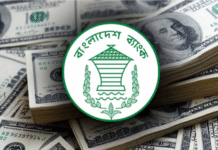Yes another economic landmark for politically-troubled Bangladesh.
After achieving UN-set poverty alleviation goals for 2015 two years before time and achieving a current account surplus for the first time in its independent history, Bangladesh has another first to boast off.
After record remittances and foreign exchange levels, Bangladesh has now been able to bring down its food import bill and reverse an always upward trend for the first time — thanks to record bumper harvests over several successive years.
Earlier, the cost of food imports increased alongside the rise in export income.
But in the 2012-13 fiscal, as export income climbed 11.22 percent, the import cost was cut down by nearly 4.5 percent, specially due to reduced expense on food imports.
Despite the decline in overall import cost, Bangladesh Bank (BB) Governor Atiur Rahman is optimistic that the increase of import of capital machineries surely will have a positive impact on country’s economy.
Economist Zaid Bakht, however, fears a negative impact on the GDP growth due to the drop in import of raw materials.
Latest BB data indicates Bangladesh traded in goods worth nearly $33.97 billion against $35.52 the previous year.
In 2011-12 fiscal, the cost was 5.52 percent higher than the previous year.
The cost increased by a staggering 41.79 percent in 2010-11 fiscals as compared to the previous year.
Analysis shows the county spent less money in importing all goods except capital machineries and wheat in the last fiscal over the previous fiscals. The import of fuel has also been cut down.
The opening of letters of credit (LC) for bringing in capital machineries needed for setting up industries and purchase of wheat have also increased by 30.39 and 20 percent, respectively in the 2012-13 fiscal.
Bangladesh registered a current account balance surplus in foreign transaction during the year.
There was a $2.52 billion surplus at the end of the fiscal while the 2011-12 fiscal had a deficit of $44.7 million when it closed down.
The deficit in the previous fiscal had stood at $1.68 billion.
Atiur Rahman listed some factors that he believed had brought down the costs of imports.
“The food import bill has come down sharply due to rise in agricultural output,” he said.
He claims drop in prices of products in the international market was another reason.
“Our forex reserve crossed the 16 billion dollar-mark for the first time too,” he said.
The central bank chief said the reserves were “enough to pay off the country’s five month’s import bills.”
“It is true that the import of capital machineries increased at the end of the fiscal. It happened mainly because of the fall in dollar prices,” Zaid Bakht told bdnews24.com.
The price of dollar had climbed nearly to Tk 85 once. Now it is stable around Tk 77.75.
“The entrepreneurs are uncertain owing to the political turmoil and several problems in infrastructure sectors. But they know the situation will not last long,” he added.
He said the entrepreneurs had imported capital machinery and equipment now that the dollar had fallen against the Taka, which could change later..
Expatriate Bangladeshis sent back home a record $14.46 billion in remittances during the 2012-13 fiscal year.
The amount is 12.6 percent more than the remittances during the previous fiscal.
The country earned $27.02 billion by exporting goods abroad in the last fiscal, which is 11.18 percent higher than the previous fiscal.
Source: bdnews24










